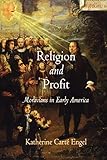Religion and Profit : Moravians in Early America / Katherine Carté Engel.
Material type: TextSeries: Early American StudiesPublisher: Philadelphia : University of Pennsylvania Press, [2013]Copyright date: ©2009Description: 1 online resource (328 p.) : 17 illusContent type:
TextSeries: Early American StudiesPublisher: Philadelphia : University of Pennsylvania Press, [2013]Copyright date: ©2009Description: 1 online resource (328 p.) : 17 illusContent type: - 9780812221855
- 9780812201857
- 284.674822
- online - DeGruyter
- Issued also in print.
| Item type | Current library | Call number | URL | Status | Notes | Barcode | |
|---|---|---|---|---|---|---|---|
 eBook
eBook
|
Biblioteca "Angelicum" Pont. Univ. S.Tommaso d'Aquino Nuvola online | online - DeGruyter (Browse shelf(Opens below)) | Online access | Not for loan (Accesso limitato) | Accesso per gli utenti autorizzati / Access for authorized users | (dgr)9780812201857 |
Browsing Biblioteca "Angelicum" Pont. Univ. S.Tommaso d'Aquino shelves, Shelving location: Nuvola online Close shelf browser (Hides shelf browser)

|

|

|

|

|

|

|
||
| online - DeGruyter The Native Ground : Indians and Colonists in the Heart of the Continent / | online - DeGruyter The King's Other Body : María of Castile and the Crown of Aragon / | online - DeGruyter Printing the Middle Ages / | online - DeGruyter Religion and Profit : Moravians in Early America / | online - DeGruyter Chile Under Pinochet : Recovering the Truth / | online - DeGruyter Middle Eastern Terrorism : From Black September to September 11 / | online - DeGruyter The Aristocracy in the County of Champagne, 1100-1300 / |
Frontmatter -- CONTENTS -- NOTE ON TERMINOLOGY -- INTRODUCTION -- CHAPTER 1: The Pilgrims' Mission -- CHAPTER 2: Interconnected Worlds -- CHAPTER 3: Moravian Expansion in the Mid-Atlantic -- CHAPTER 4: The Moral Parameters of Economic Endeavor -- CHAPTER 5: Atlantic Currents: Global War and the Fate of Moravian Communalism -- CHAPTER 6: Two Revolutions: Ending the Oeconomy and Losing the Missions -- CHAPTER 7: A Change in Mission -- CHAPTER 8: Unraveled Strands -- Conclusion -- ABBREVIATIONS -- NOTES -- INDEX -- ACKNOWLEDGMENTS
restricted access online access with authorization star
http://purl.org/coar/access_right/c_16ec
The Moravians, a Protestant sect founded in 1727 by Count Nikolaus Ludwig von Zinzendorf and based in Germany, were key players in the rise of international evangelicalism. In 1741, after planting communities on the frontiers of empires throughout the Atlantic world, they settled the communitarian enclave of Bethlehem, Pennsylvania, in order to spread the Gospel to thousands of nearby colonists and Native Americans. In time, the Moravians became some of early America's most successful missionaries.Such vast projects demanded vast sums. Bethlehem's Moravians supported their work through financial savvy and an efficient brand of communalism. Moravian commercial networks, stretching from the Pennsylvania backcountry to Europe's financial capitals, also facilitated their efforts. Missionary outreach and commerce went hand in hand for this group, making it impossible to understand the Moravians' religious work without appreciating their sophisticated economic practices as well. Of course, making money in a manner that be fitted a Christian organization required considerable effort, but it was a balancing act that Moravian leaders embraced with vigor.Religion and Profit traces the Moravians' evolving mission projects, their strategies for supporting those missions, and their gradual integration into the society of eighteenth-century North America. Katherine Carté Engel demonstrates the complex influence Moravian religious life had on the group's economic practices, and argues that the imperial conflict between Euro-Americans and Native Americans, and not the growth of capitalism or a process of secularization, ultimately reconfigured the circumstances of missionary work for the Moravians, altering their religious lives and economic practices.
Issued also in print.
Mode of access: Internet via World Wide Web.
In English.
Description based on online resource; title from PDF title page (publisher's Web site, viewed 24. Apr 2022)


